I told you about my new neighbor, the Port-o-Let. One morning, a new big truck came pulling up outside my apartment, and this guy in a yellow vest hopped out.
Armed with a long hose, he proceeded to suck the contents out of the Port-o-Let. Quick as lightning, he hopped back in his truck and was off. Now he’s been showing up in his big green truck each week, happily performing his duty.
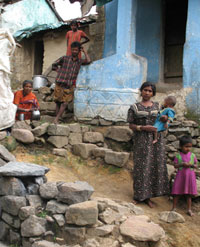 And it got me thinking. It’s easy for me to complain about the little parts of my job that bug me (like paperwork and deadlines and meetings). Watching this man gave me a new appreciation for my job. Not, by any means, that I think there is more dignity in what I do than what he does. I believe that there is dignity in the work that God has given each of us to do, no matter how our culture prompts us to view it.
And it got me thinking. It’s easy for me to complain about the little parts of my job that bug me (like paperwork and deadlines and meetings). Watching this man gave me a new appreciation for my job. Not, by any means, that I think there is more dignity in what I do than what he does. I believe that there is dignity in the work that God has given each of us to do, no matter how our culture prompts us to view it.
And learning more about the work others do around the world can give us a new perspective on our own work.
Ganesan, shown here with his family in front of his home in India*, works each day as a day laborer in other’s fields to feed his wife and two children.
Working as a day laborer is a common occupation of the parents of Compassion children, as most can’t afford to own land themselves and don’t have the education to seek other employment.
Ganesan earns about 450 Rupees a week for his work — about $10.
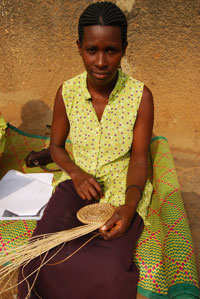
Resty is a proud mother of two in Uganda.
Her husband is an alcoholic, so a lot of the time she has to find ways to provide for her children by herself.
She hadn’t worked before, but through the Child Survival Program, she learned how to start a small business, selling charcoal by the roadside.
She gets about 20,000 Ugandan shillings a month selling charcoal — about $12.
She also learned to weave baskets through the CSP, and sells each basket she makes for about $1.
Ryan and Axl’s dads work as fishermen in Indonesia. (And, yes, that is as in Axl Rose. His dad liked rock music.)
Their fathers leave for the ocean on fishing expeditions and are gone from their family for six weeks at a time catching mackerel.
Each trip, they earn roughly 700,000 Indonesian Rupees — about $77.
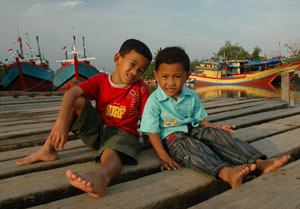
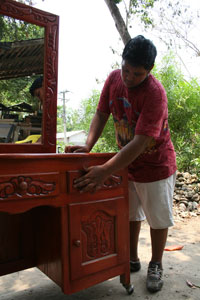 Where 17-year-old Ezequiel grew up in southern Mexico, the average worker earns $12 a week, working 20-hour days to harvest mangoes and bananas.
Where 17-year-old Ezequiel grew up in southern Mexico, the average worker earns $12 a week, working 20-hour days to harvest mangoes and bananas.
But Ezequiel’s dad is a carpenter who makes beautiful furniture.
At his Compassion child development center, Ezequiel learned how to carve wood, and together with their different skills, Ezequiel and his dad can make pieces like this dresser they just finished.
Once he graduates, a skilled woodworker like him can earn up to $55 a week, compared to the $12 of the day laborers harvesting mangoes.
In India, Suren and his wife, Rinu, both used to work full time in a brick factory. Suren lived in a dormitory at the factory, and Rinu would travel home each day to care for the family. Put together, they earned roughly 250 Indian Rupees a week — about $6 — for their family of six.
But Kajali (in the dark blue sweater) became sponsored, and her sponsors gave them a family gift, with which they bought a cycle van.
Now Suren earns many times over as a cycle van driver what he used to earn at the brick factory. When he was working at the factory and couldn’t provide a proper home for his family, Suren says, “as a parent, I felt worthless and of no good use.”
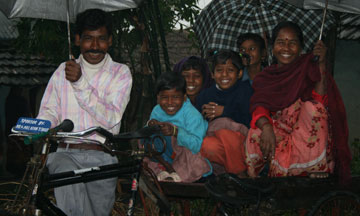
Those words tear my heart, and it’s sadly not the first time I’ve read the sentiment. How many mothers and fathers are out there, working so hard each day as farmers, drivers, and traders, scraping to provide just one or two meals for their children, and still feeling like failures?
Yet it’s so encouraging to know that even a small gesture can transform a family’s life. Suren is now filled with pride for the way he can care for his family. He says, “through Kajali and her beloved sponsor, we have now tasted of the goodness of God’s awesome power.”
<hr/ >
*NOTE FROM EDITOR: This content honors Compassion’s historical work in India. While we no longer have an India sponsorship program, we are grateful for the lives changed and meaningful work achieved through our sponsors and donors in our nearly 50 years there. For a detailed explanation of the end of our sponsorship program in India, please visit: compassion.com/india-update.







10 Comments |Add a comment
“i know i would do ANYTHING to make sure that my boys had a home, food, clothing…”
Thanx Kristen. I believe that is exactly the sentiment we (as advocates for children living in poverty) need to convey when we are sharing about the Compassion ministry. Standing up before a congregation, citing statistics and sharing experiences is only the tip of the iceberg…There is a need to present these suffering children ‘as if’ they were our very own.
What if that was my daughter’s picture in that packet I was holding up.
However, there is a risk involved with this type of involvement that many folks are not willing to take on and that is a shame. While Jesus did say His yoke was easy and His burden was light, let us be mindful that although ‘easy and light,’ there is still a yoke and burden to bear. Let’s not make tears (and such) heavier than they really are.
Bear one another’s burdens, and so fulfill the law of Christ. Galatians 6:2
As a fairly new sponsor, and having just heard something about Compassion’s Mission: Haiti which involved giving goats as gifts, I called the Call Center to ask how I could give a goat to the family of my (first) girl in the Dominican Republic. (A) Compassion couldn’t help me with that, as it had been a limited program for Haiti; (b) the person I spoke with pointed out that, while I wanted to give a goat, the family might really need something else, worse…like, a bed, or something. The recommendation was simply that I give whatever amount I could within the family-gift range. Project staff works with the family on how they can best use the gift.
When I began sponsoring my fourth child, who was 13 yrs., at the time, I also arranged for a birthday gift, as hers was coming up in a couple of months. Her letter of thanks was incredible and humbling: I had sent $25; she tithed on it, bought a pair of shoes, a bed, and spent the rest on food for the family.
Later, I sent a family gift that paid for her school uniform (in some countries, the rule is, no uniform, no school), a piece of land, and food for the family. I realize the parcel of land might be quite small, but it is hers, and I’m sure the family is making good use of it to grow crops for themselves, or feed the hen they bought with another gift.
Would I have known to buy any of those things for them? Uh-uh.
thank you for this post!
it is a wonderful reminder that parents all over the world simply want to love, take care of and provide for their children. i know i would do ANYTHING to make sure that my boys had a home, food, clothing…
i pray for all our compassion kids’ parents–that they are encouraged today knowing that they are doing amazing and sacrificial things to take care of their children. i pray that God blesses and multiplies their efforts each day and gives them a new measure of hope every day.
We could give gifts to our children’s families and mark it something like “To help the parent(s) make a greater source of income.” Maybe some parents could use some tools, or if they just had another cow, it would make a huge difference.
Kees
I never thought about what a sponsor gift could go towards, besides focusing directly on the child. Seeing what an impact that had on the entire family (the cycle-van to make a living) has certainly given me a new viewpoint – just look what that gift did!
What a delightful account of labor around the world! Very interesting and touching. I love how Compassion puts education and skills in a child’s life so they can get out of the cycle of poverty. Obviously, the whole family benefits from the sponsor’s support.
Your post reminded me of this video regarding the Dalits in India.
The story of the Indian farmer touches my heart.Is there any other way to help this family with better work so he can earn more money a week?Id be willing to help and I think others would also!
I know we had this conversation awhile ago, but it would be so helpful if we knew what type of family gift would best help the families of our kids. If we knew a larger gift would enable them to buy something to make a living with, like this cycle van, then we could send that. But sending smaller gifts 2 or 3 times a year might actually benefit some families more if they used it to buy additional food. I don’t know if there is an answer to this but wish there was some way to find out for those of us who want to know the specifics of the needs of our particular children’s families.
For those of you following the comments on Chris’ post on August 18th, Ezequiel, who has learned the trade of wood-carving, is from Chiapas, one of the poorest areas of Mexico.